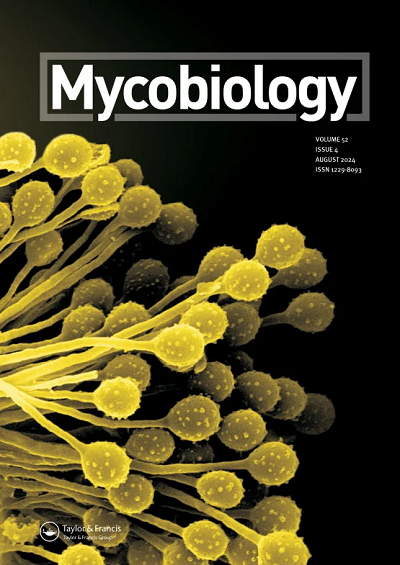贮藏温度对香菇(Lentinula edodes)活性物质含量的影响
IF 1.6
4区 生物学
Q2 AGRONOMY
引用次数: 0
摘要
香菇(Lentinula edodes)含有丰富的促进健康的化合物,具有很高的营养和药用价值。然而,采收后长期储存对促进健康化合物水平变化的影响尚未得到广泛研究。在这项研究中,我们研究了香菇在三种不同温度(1,3和5°C)储存4周后酚类化合物、抗氧化剂、垂垂腺嘌呤和麦角硫因的水平变化。与低温贮藏的蘑菇相比,贮藏2周后,5℃贮藏的蘑菇菌毛中总酚含量较高;然而,在5℃的贮藏条件下,这些蘑菇的子实体也会变质。在所有温度下储存的蘑菇中,菌毛中的垂腺嘌呤含量在储存2周后有增加的趋势。相比之下,菌毛中麦角硫因的含量在贮藏过程中下降,在5℃贮藏4周的蘑菇中检测到的麦角硫因含量显著降低。总之,这些结果表明酚类物质和垂垂腺嘌呤积累的机制可能与蘑菇在储存过程中的变质有关。我们的研究结果表明,香菇中促进健康的化合物的水平受到储存温度的影响,这表明通过调节储存条件可以控制特定生物活性化合物的调节。本文章由计算机程序翻译,如有差异,请以英文原文为准。
Influence of Storage Temperature on Levels of Bioactive Compounds in Shiitake Mushrooms ( Lentinula edodes )
Shiitake mushroom (Lentinula edodes) hold high nutritional and medicinal value as they contain an abundance of health-promoting compounds. However, the effect of long-term postharvest storage on the variation in the levels of health-promoting compounds has not been extensively studied. In this study, we investigated the changes in the levels of phenolic compounds, antioxidants, eritadenine, and ergothioneine in shiitake mushrooms stored at three different temperatures (1, 3, and 5 °C) for 4 weeks. Compared to mushrooms stored at lower temperatures, those stored at 5 °C exhibited a higher level of total phenolics in their pileus after 2 weeks of storage; however, storage at 5 °C also increased the deterioration of the fruiting body of these mushrooms. In mushrooms stored at all temperatures, the eritadenine content in the pilei tended to increase up to 2 weeks of storage. In contrast, the ergothioneine content in the pileus decreased during storage, with a significantly lower level detected in mushrooms stored at 5 °C for 4 weeks. Together, these results suggest that the mechanisms underlying the accumulation of phenolics and eritadenine may be related to mushroom deterioration during storage. Our findings indicate that the levels of health-promoting compounds in shiitake mushrooms are influenced by storage temperature, suggesting the potential to control adjustments of specific bioactive compounds by regulating storage conditions.
求助全文
通过发布文献求助,成功后即可免费获取论文全文。
去求助
来源期刊

Mycobiology
AGRONOMYMYCOLOGY-MYCOLOGY
CiteScore
3.90
自引率
5.30%
发文量
41
审稿时长
22 weeks
期刊介绍:
Mycobiology is an international journal devoted to the publication of fundamental and applied investigations on all aspects of mycology and their traditional allies. It is published quarterly and is the official publication of the Korean Society of Mycology. Mycobiology publishes reports of basic research on fungi and fungus-like organisms, including yeasts, filamentous fungi, lichen fungi, oomycetes, moulds, and mushroom. Topics also include molecular and cellular biology, biochemistry, metabolism, developmental biology, environmental mycology, evolution, ecology, taxonomy and systematics, genetics/genomics, fungal pathogen and disease control, physiology, and industrial biotechnology using fungi.
 求助内容:
求助内容: 应助结果提醒方式:
应助结果提醒方式:


